In the business environment, they quickly realized that behavioral psychology can be used to optimize and increase conversions on sites. The principles of persuasion from behavioral psychology can be applied to many online channels: they work in both email marketing and search advertising, and to increase conversion on sites, not only in the field of e-commerce, but also in many others.
Principles of Persuasion by Robert Cialdini
The basic principles of persuasion have been known for many years. The studies on which they are based were carried out back in the 60s-70s of the 20th century. And in 1984, Professor Robert Cialdini, a well-known researcher in the field of social psychology, popularized the main of these ideas in his book Influence: The Psychology of Persuasion.
In the time that has passed since the publication of this book, it has managed to become a fundamental guide to the psychology of marketing, and in this age of Internet technology, the 6 principles that Cialdini once formulated a long time ago have been successfully adapted for use in Internet marketing in general and to optimize conversions on websites in particular. After all, any action of the visitor on target page of your site is the result of his belief in the need for this action.
The principles of persuasion formulated by Dr. Cialdini include:
-
Deficiency/lack - any product, service or action seems more attractive if we are informed that their quantity is limited or the time during which they will be available.
-
Authority People tend to listen to the opinions of those who are considered experts.
-
Likeness/sympathy People tend to take sides with those they like or have something in common with them.
-
social proof The tendency of people to do what many others have already done before them.
-
Consistency/commitment - once having expressed some intention or opinion, people tend to stick to it in the future.
-
Reciprocity Give if you want something in return.
Applying Cialdini's principles to increase conversions.
Principle #1 - Scarcity
This principle is based on a very important feature of human nature - the fear of losing something. The fear of loss is a stronger feeling than the anticipation of something positive. Evidence of this can be found in a well-known experiment conducted in 1988 among homeowners in California and later described in the Journal of Applied Psychology.
For the experiment, two groups of homeowners were selected, who were offered to insulate their homes. However, one group was told that insulating their homes would save them a certain amount each day. And the second group was told that the refusal to insulate the house would lead to the fact that every day they would lose the same amount. The results showed that in the second group there were much more people who agreed to insulate their home. Talking to people in the language of loss is much more effective.
Now back to the very principle of scarcity and its use. Any goods or services attract more of our attention when we are aware of their limited supply. In marketing, this is used in messages accompanying the product, and claiming that “this is the last copy” or “the discount on it is only valid for n days!”. This is one of the most popular ways to increase sales and increase conversions.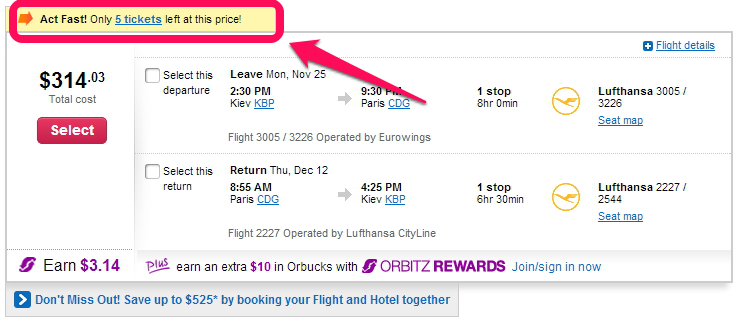
For example, the popular travel planning website Orbitz.com urges: “Act quickly! Only 5 tickets left at this price!”. In this way, they directly inform their visitor that such a price will not last long, and he may miss the opportunity to buy tickets at a better price.
Another great example is published on the site Monetate. In one online A/B store, testing two options for the price of a jacket—with a shortage indicator (B) and without it (A)—showed that option B resulted in a real, if small, increase in conversions. The shortage indicator in this situation was the countdown timer, which showed how much time was left before the end of the promotion for this product.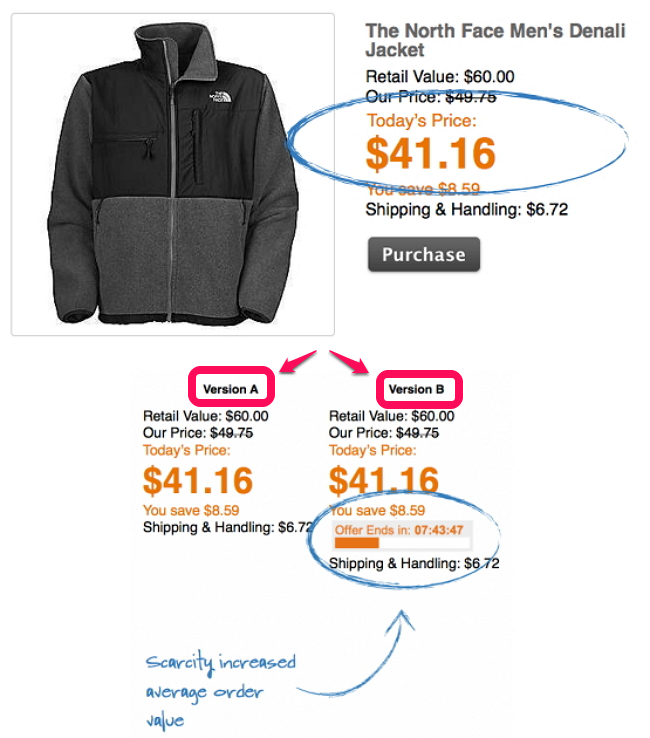
Principle #2 - "Authority"
In our modern life, it is becoming more and more difficult to make any decision, because more and more time is needed to understand the essence of the situation, and we have less and less of this time.
It is in such cases that we really want to trust the opinion of experts. After all, these people, by definition, have more information than we do. The only thing we can be puzzled with in this case is the choice of the right expert. But it's still the fastest and most efficient way.
Of course, marketers could not miss such valuable information, who quickly realized that, in their general mass, human beings tend to obey authorities.
Moreover, not only knowledge can create an aura of authority, but also simpler and so easily faked “social accessories”, for example, a uniform or position (it is enough to recall dozens of examples of advertising campaigns medical drugs, the usefulness of which is so selflessly broadcast by various doctors in commercials).
In Internet marketing, the principle of authority is also very widely used. The most popular way is the publication of various certificates and awards, public coverage of achievements and victories. If we are talking about the b2c (business to client) sphere, authoritative personalities can be used in advertising campaigns, whose opinion is respected among the target audience.
For the b2b (business to business) sphere, confirmation of credibility and level of competence can be the holding of webinars by company specialists, maintaining a corporate blog with useful and important information, etc.
Example: ShoeDazzle online store.
This store specializes in women's shoes and accessories. The company was founded back in 2009 and among its founders was the famous socialite Kim Kardashian, who was also credited with the functions of one of the main fashion designers of shoes. It is not known how true this was, but the chosen target audience (young women obsessed with fashionable shoes) was affected by Kardashian's authority because she regularly appears at public events in fashionable designer shoes.
Principle #3 - "Similarity/sympathy"
Professor Cialdini calls this factor one of the most significant, because it is not so easy to understand the meaning of the word “like”, but the result is always indicative - the one we like influences our opinion in one way or another. And the more we like it, the more we are affected by it. However, this feeling of sympathy for something or someone is based on something about as ghostly and individual as the criteria for beauty.
If we talk about increasing the conversion on the site, then this factor is best regulated by the page “About company”/”About us”no matter how absurd and primitive it may sound. The main task of this page is to tell your potential buyers about what unites you with them, perhaps your employees are somewhat similar to your potential buyers, or your office and the work environment shown are sympathetic to your site visitors.
As a good example, a small company fits very well petrelocation.com, which specializes in helping pet owners transport their beloved pets from one country to another.
The company's website has a "Our Team" section, which contains photos of each employee and his brief biography. The section is designed in such a way as to emphasize the love of all employees for pets. Stories about the hobbies and hobbies of the company's leaders also contribute to rapprochement with site visitors.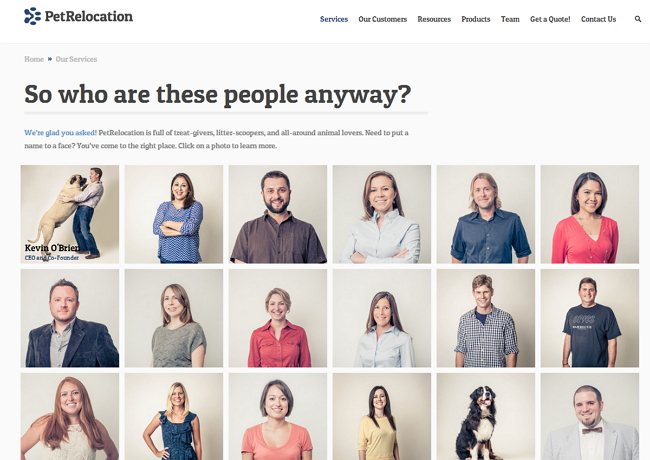
A lot of research has been done on the liking factor, proving it right. For example, back in 1963, researcher F. B. Evans analyzed data from insurance companies and proved a real connection: customers were more likely to buy an insurance policy if it was offered to them by a seller who had something in common with them - a similar age, religious or political views, etc.
Principle #4 - "Social Proof"
The essence of the principle: a person has a tendency to do what others have already done before his eyes or before him. The feeling based on observing the actions and actions of other people is very strong and often completely unconscious. And the more there were such people, the stronger this feeling. This is where the idea of “reliability of large numbers” comes into play, manifesting itself in thoughts like “so many people can’t be wrong.”
For example, very often this principle works when we are in an unfamiliar city and are looking for a cafe to dine - the more people we see in any institution, the more reliable it seems to us.
If we talk about using the principle of social proof on websites, then the simplest example is an online store. Modcloth.
A feature of this store is the very good support of its own community of buyers, in which surveys are regularly conducted, enabling buyers to choose the models of clothes that they want to see on sale in the store in the future, that is, buyers in some way become buyers of the store.
Models with the most votes go on sale with a special badge - "Customers' Choice". The sales statistics are more than indicative - clothes marked with the coveted badge are sold many times better than the rest.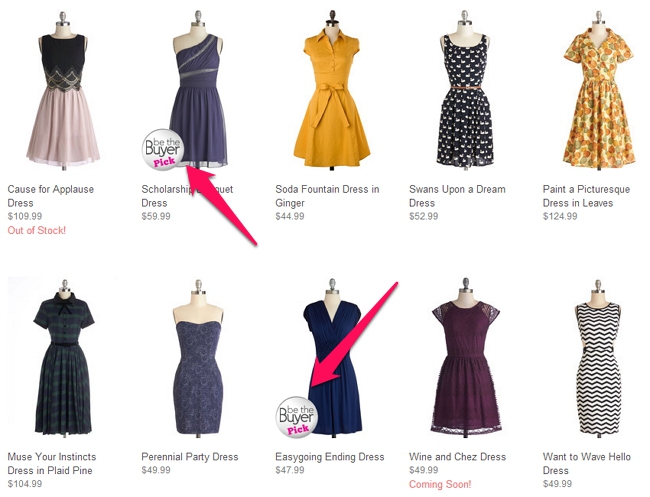
Principle #5 - Consistency/Commitment
The basic idea behind the Consistency Principle is that most people have an inherent inclination to stick to their stated intentions or commitments.
How is it used in internet marketing?
The most popular example is to offer a potential buyer a free trial of their product, or a free first use of a service.
As an example, one very well-known resource among Western Internet marketers is Copyblogger. This resource maintains a popular and useful blog about Internet marketing, and also offers paid access to an advanced version of educational content, plus various paid seminars and webinars.
As soon as you get on Copyblogger, you will definitely notice an offer to subscribe to blog updates, for which you will only need to leave your email. And providing an email address is already a form of public commitment and is the first step in turning you into a regular Copyblogger customer.
By the way, immediately below the offer to subscribe to blog updates, you can also notice the use of the following principle from Cialdini's list - the principle of reciprocity. Copyblogger invites you to register to access free content.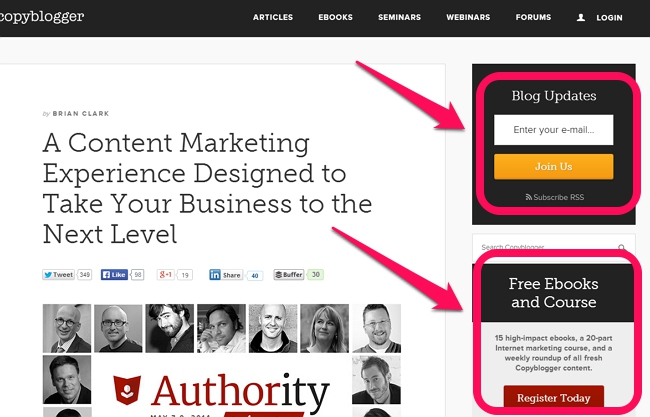
Here it is important not to miss one very significant point - the expression of any intentions must be absolutely voluntary, otherwise the desired effect will never be achieved. Enforced commitments turn into an unpleasant burden, not a commitment.
Principle #6 - "Reciprocity"
The principle of reciprocity is very simple - in order to get something, you must first give. In the language of human relationships, this means that we humans, for the most part, tend to thank kindness for kindness and treat others as we were treated. And in the language of psychology, this principle means that many of us feel indebted to those from whom we have ever received some favor, help or benefit.
Content marketing, which is gaining popularity now, is based on this principle, when you absolutely free of charge provide your customers with any content that is useful to them, for which they in return feel a kind of obligation to somehow thank you for this, for example, to buy something that sell, or subscribe to the newsletter, etc.
The already mentioned Copyblogger resource is a great example of this principle in itself. Another great example is the Quick Sprout resource owned by Neil Patel, the founder of such successful Internet projects as KISSmetrics and CrazyEgg.
Quick Sprout is an authored blog that provides readers with lots of helpful tips on how to make more money with online marketing. Along the way, consulting services for business development on the Internet are being promoted, as well as its own software development Quick Sprout Traffic System, which helps to attract more traffic to e-commerce sites. Thanks to the blog and all the useful information that is provided completely free of charge, many readers sooner or later become real clients of Neil Patel. As soon as you get to the Quick Sprout website, you see a pop-up window in which you are offered to leave your email and get information completely free of charge for SEO promotionwhich is usually sold for money.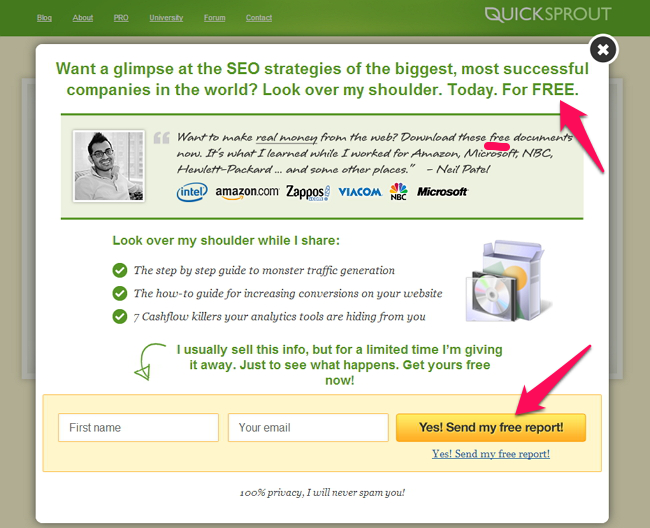
An example of the principle of reciprocity at work in the real world is the American War Invalid Organization, which collected donations by sending out beautifully written letters, but received only 18% responses. However, as soon as this organization attached a very small gift to the envelope, the percentage of positive answers increased sharply to 35%, that is, almost doubled!
This is where the principles of Robert Cialdini end. In conclusion, I would like to note that they all work well separately, but even better - in a complex. When used correctly, these principles of persuasion can dramatically increase conversions on your website. However, do not forget that every business has its own characteristics and goals, and for the best effect, it is useful to test any ideas and innovations by testing.






